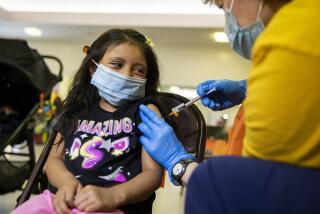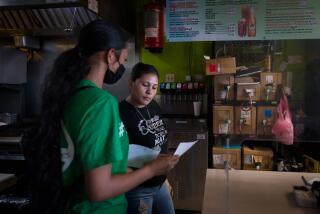Computers to Help County Keep Track of Immunizations : Diseases: The public health project would provide an electronic system to focus on the 40% of the area’s toddlers in need of proper shots.
- Share via
After years of fighting childhood diseases with needles and serum, Ventura County has enlisted a new weapon: the computer.
The county Public Health Services Department is setting up a computer system that should one day tell doctors which children need shots and when they need them. The computer could even call parents at home to remind them about immunizations.
“What I’m trying to do is build an immunization tracking system that we can use countywide,” said Dr. Gary Feldman, public health officer.
With an estimated 40% of Ventura County’s toddlers lacking proper vaccinations, Feldman is hoping that doctors and nurses will begin thinking about shots whenever they see a child for a routine checkup, clinic visit or emergency room call.
The county’s efforts coincide with a national push for more comprehensive childhood immunizations. A study released last month by the Institute of Medicine of the federal National Academy of Sciences found that one-third of the nation’s 2-year-olds have not received a full set of shots. President Clinton has made childhood immunization a major initiative of his health agenda.
Because schools require certain inoculations before allowing children to enter kindergarten, nearly all kids have their shots by age 4 or 5. But for many children, that’s not soon enough, Feldman said.
“The diseases we’re protecting against most affect kids under 2,” he said. “So most kids are immunized, but they’re immunized too late.”
Before their second birthday, children should have a series of shots for such diseases as hepatitis, polio, diphtheria, tetanus, mumps, measles and rubella. A chicken pox vaccine is being tested and soon could be added to the series.
Notably absent is the smallpox vaccination, a painful shot that would leave an ugly scar on children’s arms. Now that immunization has virtually wiped out the disease, the inoculation is no longer needed, Feldman said.
That is the ultimate goal of immunization. For now, Ventura County is content to increase the proportion of vaccinated youngsters.
Feldman, a pediatrician with a master’s degree in computer science, is developing a high-tech registry with updated vaccination information on children across the county. San Bernardino County recently received a grant to set up such a program, and several other locales in California have started building registries.
Ventura County has hired systems analyst Michelle Freier to set up its program, which should be ready within a year and is not expected to require substantial additional funding. Freier said the Department of Public Health Services already has the necessary software, part of a package now used for billing and financial data.
The computer program has the capacity to keep track of thousands of children and issue postcards or even make phone calls reminding parents about shots, Freier said.
The first step in building a registry involves entering existing records for children treated by public health workers. Then, the program could expand to include those immunized at county clinics or Ventura County Medical Center.
Finally, Feldman hopes to enlist private physicians and their patients in the program. That would require state legislation, allowing doctors to waive their young patients’ confidentiality on immunizations, he said.
Once a registry is set up, doctors and nurses could turn to it when they treat any toddler. County workers could also check for immunizations when they are administering social-service programs, such as the federal Women, Infants and Children program for new mothers, Feldman said.
Some children do not receive the proper shots simply because their parents can’t afford them--a series of hepatitis shots can cost $70, and a full set of vaccinations ranges from $150 to $200.
In response, public health has begun offering free immunizations, including sending nurses out to neighborhoods to vaccinate children.
“It’s great that they do this,” said Tammy Reed of Newbury Park, who brought her 21-month-old son, A. J., to a free clinic there. “It’s so expensive to get those shots through the pediatrician and the insurance doesn’t cover it.”
Reed’s doctor told her about the clinic rather than charging her for the shots.
Despite the free immunizations, some children go unprotected because their parents are uninformed about them or don’t understand the need.
“There’s no sense of urgency with immunizations,” explained senior public health educator Selfa Saucedo of the county’s immunization program. “There’s not a big epidemic of polio, meningitis.”
A measles outbreak in 1990 prompted a rush of parents bringing children in for shots. “Since then, it seems people get lulled into a false sense of security,” Saucedo said. The new computer system should not only keep track of children’s vaccinations, but remind parents when to come in, she added.
“This should pick up a lot of kids who have been falling through the cracks.”
More to Read
Sign up for Essential California
The most important California stories and recommendations in your inbox every morning.
You may occasionally receive promotional content from the Los Angeles Times.













